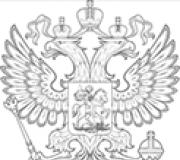The problem of human duplicity and hypocrisy arguments. Duplicity duplicity (Arguments of the Unified State Examination)
Good day, dear friends. In this article we offer an essay on the topic “from literature.”
The following arguments will be used:
– A. P. Chekhov, “Tears of a Crocodile”
– D. London, “Martin Eden”
Since ancient times, people have tended to hide their true emotions and innermost thoughts. There are areas in which sincerity is not at all desirable, such as politics or gambling. Upon reflection, we can admit: every adult must sometimes resort to falsehood; not every degree of it must be stubbornly condemned. For example, having met a person who is unpleasant to us, we smile and greet him, carry on a conversation, that is, we behave counterfeitly. But if we show a real attitude towards the interlocutor, we can be accused of rudeness, because he is friendly towards us.
The main task of each of us is to feel the difference between forced politeness and outright deceit. Manifestations of the latter must be avoided: it poisons a person’s soul and weans him from sincerity. Only with the help of an open, sincere disposition towards others can you build trusting relationships with them.
In A.P. Chekhov’s story “Tears of a Crocodile,” the main character Polikarp Semyonovich Judin is an example of pure hypocrisy. On a rainy day, he stands at the window, watching the rich funeral procession and talks about life. At first glance, the hero’s thoughts seem fair and involuntarily evoke a feeling of agreement with him. Judah is completely immersed in thoughts about the vices and mistakes of mankind. The main culprit of such phenomena as corruption, shame and poverty, in his opinion, is man.
However, the subsequent behavior of Polikarp Semyonovich instantly repels and reveals his true essence. His mental monologues are full of worries, indignations about injustice and the difficult situation of poor people. But during conversations with Semyon Ivanovich, the hero shows that in fact he is indifferent to the problems of those around him.
People come to Judah to pawn some thing because of an urgent need for cash. But the indifferent hero robs the poor who have turned, he is not touched by their difficulties. He mentally accuses the rich of being heartless, although he himself acts in the same way. The true actions of Polycarp of Judas expose his duplicity and insincerity.
IN novel of the same name Jack London "Martin Eden" the hypocrisy of others played main role in the fate of the hero. Young sailor Martin Eden decides to quit sailing and take up writing after a change in his life. He falls in love with a girl named Ruth, with whom he is separated by a huge intellectual chasm. young hero Not afraid of this obstacle, he decides to get the girl and begins to work hard.
Martin becomes a frequent visitor to the library, studies science and tries to write himself. He does not spare himself: he sleeps 4 hours a day and periodically fasts in order to be able to send his work to editors. Having achieved an engagement with Ruth, Martin tries to become successful writer to be able to have a wedding and ensure a life without need. But luck does not smile on the hero, and his loved ones do not believe in him.
Members of Ruth's family have a negative attitude towards Eden's idea; the girl herself is constantly trying to get him a job; The hero's sisters also do not believe in the success of his work. After a misguided scandal involving Martin, Ruth breaks off their engagement, and those around him begin to view him negatively. The hero falls into a deep depression and completely loses the desire to engage in writing. Ironically, it was at this time creative life Eden changes dramatically: publishing houses begin to publish his works.
A separate example of hypocrisy was provided by the case in the editorial office of Transcontinental. Being unknown writer, Martin was only able to extract his well-deserved wages by force; the college employees denied having five dollars. But after Eden gained fame, his works began to be suddenly published by all the publishing houses that had previously stubbornly refused him. Such an act indicates corruption and deceit. printed publications. The sudden success of the writer turned all the editors into his “fans” and “friends”.
The exact same situation happened with Martin’s entourage. Everyone who had a conflicting attitude towards him before he gained fame immediately began to seek his attention and affection. His beloved did the same: Ruth suddenly came to Eden with an apology and a desire to get married, which finally finished off the hero. He could not get anyone to believe in himself and his capabilities when he needed it, but now the company of other people was unbearable for him.
It was becoming increasingly difficult for Martin to bear the open hypocrisy of those around him. Deciding to live on a separate island, he sets sail on a ship. But even there it is difficult for the hero to communicate with people, and later to be alone with himself. The only solution for Martin Eden is eternal rest in the cold sea waters.
Duplicity in behavior inevitably repels others. Noticing this trait, you involuntarily doubt the sincerity of every phrase spoken by a person. They resort to hypocrisy when persecuting specific goals, or experiencing fear. The question is, are the ends worth the means? You cannot hide your true emotions and thoughts, or be afraid of them. Having caught a person in falsehood, trust, and sometimes respect for him, is lost.
Today we talked about the topic " The problem of hypocrisy: arguments from literature." This option you can use to prepare for the Unified State Exam.
Argumentation of your opinion on the chosen problem is one of most important tasks when writing an argumentative essay. Since arguments from the literature are rated higher, it is very important to prepare them in advance. On this page I present a number of arguments on several popular issues.
PROBLEM: Meanness, betrayal, dishonor, envy.
- A.S. Pushkin, novel “The Captain's Daughter”
Shvabrin is a nobleman, but he is dishonest: he takes revenge on Masha Mironova for her refusal, and during a duel with Grinev, he stabs him in the back. The complete loss of ideas about honor and dignity provokes him to betrayal: he goes over to the camp of the rebel Pugachev.
- Karamzin “Poor Liza”
Erast, the heroine’s lover, betrayed his feelings for the girl, choosing material well-being
- N.V. Gogol, story “Taras Bulba”
Andriy, son of Taras, being captured love feelings, betrays his father, brother, comrades, homeland. Bulba kills his son because he cannot live with such shame
- A.S. Pushkin, tragedy "Mozart and Salieri"
The envious Salieri, jealous of the success of the great composer Mozart, poisoned him, although he considered him his friend.
PROBLEM: Worship of rank, servility, servility, opportunism.
1. A.P. Chekhov, story “The Death of an Official”
The official Chervyakov is infected with the spirit of veneration: Having sneezed and splashed the general’s bald head, he was so frightened that after repeated humiliations and requests, he died of fear.
2. A.S. Griboyedov, comedy "Woe from Wit"
Molchalin, negative character comedy, I am sure that you need to please everyone without exception. This will allow you to climb career ladder. Caring for Sophia, Famusov's daughter, he pursues precisely this goal.
PROBLEM: Bribery, embezzlement
- N.V. Gogol, comedy "The Inspector General"
The mayor, like all officials county town, - a bribe-taker and embezzler. He is convinced that all issues can be solved with the help of money and the ability to show off.
- N.V. Gogol, poem "Dead Souls"
Chichikov, drawing up a bill of sale for the “dead” souls, gives a bribe to the official, after which things move faster.
PROBLEM: Rudeness, ignorance, hypocrisy
- A.N. Ostrovsky, drama "The Thunderstorm"
Dikoy is a typical boor who insults everyone around him. Impunity gave rise to complete unbridledness in this man.
- DI. Fonvizin, comedy "Minor"
Mrs. Prostakova considers her boorish behavior to be normal, which is why the people around her are “brutes” and “morons.”
- A.P. Chekhov, story "Chameleon"
Police warden Ochumelov grovels before those who are above him on the career ladder, and feels like a master of the situation before those who are below. This is reflected in his behavior, which changes depending on the situation.
PROBLEM: The destructive influence of money (material goods) on the human soul, hoarding
- A.P. Chekhov, story “Ionych”
Doctor Startsev, a promising and talented doctor in his youth, turns into Ionych’s hoarder. Main passion his life is money, which became the cause of moral decay of the individual.
- N.V. Gogol, poem “Dead Souls”
The stingy landowner Plyushkin personifies complete spiritual degradation. The passion for hoarding became the reason for the destruction of all family and friendly ties; Plyushkin himself simply lost his human appearance.
PROBLEM: Vandalism, unconsciousness
- I.A. Bunin "Cursed days"
Bunin could not even imagine that the brutality and vandalism brought by the revolution would turn people into a maddened crowd, destroying everything in its path.
- D.S. Likhachev, book “On the Good and the Beautiful”
The Russian academician was outraged when he learned that the monument to Bagration’s grave was blown up on the Borodino field. This is a terrible example of vandalism and oblivion.
- V. Rasputin, story “Farewell to Matera”
When villages were flooded, not only people’s homes went under water, but also churches and graveyards, which is a terrible example vandalism.
PROBLEM: The role of art
- A.T. Tvardovsky, poem “Vasily Terkin”
Front-line soldiers say that soldiers exchanged smoke and bread for clippings from front-line newspapers, where chapters of the poem were published. This means that an encouraging word was sometimes more important than food.
Natasha Rostova sings beautifully, at these moments she becomes extraordinary beautiful and people those surrounding her are reaching out to her.
- A.I. Kuprin, story “Garnet Bracelet”
Listening to " Moonlight Sonata"Beethoven, Vera experienced, thanks to the hopelessly in love Zheltkov, a feeling similar to catharsis. Music awakened in her empathy, compassion, and a desire to love.
PROBLEM: Love for the Motherland, nostalgia
- M.Yu. Lermontov, poem “Motherland”
The lyrical hero loves his homeland as it is, and is ready to go through all the trials with his people.
- A. Blok, poem “Russia”
For lyrical hero Blok's love for his homeland is like love for a woman. He believes in the great future of his country.
- I.A. Bunin, stories “Clean Monday”, “Antonov Apples”
I.A. Bunin left Russia forever in 1920. A feeling of nostalgia haunted him all his life. The heroes of his stories recall the great past of Russia, which was irretrievably lost: history, culture, traditions.
PROBLEM: Loyalty this word(to debt)
- A.S. Pushkin, novel “Dubrovsky”
Masha, married to an unloved man, refuses to break the oath of fidelity given in the church when Dubrovsky tries to save her.
- A.S. Pushkin, novel “Eugene Onegin”
Tatyana Larina, true to her marital duty and her given word, is forced to refuse Onegin. She became the personification moral strength person.
PROBLEM: Self-sacrifice, compassion, mercy, cruelty, humanism
- M.A. Bulgakov, novel “The Master and Margarita”
Margarita, who loves the Master, in spite of everything, is true to her feelings, she is ready for any sacrifice. A woman flies to Woland's ball to save her beloved. There she asks to free the sinner Frida from suffering.
- A.I. Solzhenitsyn, story "Matrenin's Dvor"
Matryona lived all her life for people, helping them without asking for anything in return. The author calls her a “truthful woman,” a person who lives according to the laws of God and conscience
- L. Andreev, story “Biter”
Having tamed a dog and left it in the winter holiday village, people showed their selfishness, showed how cruel they can be.
The Cossack Gavrila, having lost his son, fell in love with a stranger, an enemy, as if he were his own. Hatred for the “Reds” grew into fatherly love and care.
PROBLEM: Self-education, self-education, self-analysis, self-improvement
- I.S. Turgenev, novel “Fathers and Sons”
The nihilist Bazarov believed that “every person must educate himself.” And this is the lot of strong people.
- L.N. Tolstoy, trilogy “Childhood. Adolescence. Youth"
Nikolenka is an autobiographical hero. Like the author himself, he strives for self-improvement and creative self-realization.
- M.Yu. Lermontov, novel “Hero of Our Time”
Pechorin talks with himself in his diary, evaluates his actions, analyzes his life, which testifies to the depth of this personality.
- L.N. Tolstoy, novel "War and Peace"
The writer showed us the “dialectic of the soul” of Bolkonsky and Bezukhov, told us how difficult a person’s path to truth, justice, and love is. His heroes made mistakes, suffered, suffered, but this is the idea of human self-improvement.
PROBLEM: Courage, heroism, moral duty, patriotism
- B. Vasiliev, “And the dawns here are quiet”
The female anti-aircraft gunners, destroying a detachment of saboteurs, died, despite the numerical superiority of the enemy.
- B. Polevoy, “The Tale of a Real Man”
Pilot Alesey Maresyev, thanks to fortitude and courage, not only survived after amputation of his legs, but also became a full-fledged person and returned to his squadron.
- Vorobyov, story “Killed near Moscow”
The Kremlin cadets, showing courage and heroism, fulfilled their patriotic duty, defending the approaches to Moscow. Lieutenant Yastrebov is the only one left alive.
- M. Sholokhov, story “The Fate of a Man”
The hero of the story, Andrei Sokolov, went through the entire war: he fought bravely, was captured, and escaped. He fulfilled his civic duty with honor. The war took his family away from him, but, fortunately, fate gave him a meeting with Vanyushka, who became his son.
- V. Bykov “Crane cry”
Vasily Glechik, still just a boy, did not leave his position during the war. The thought of salvation was unacceptable to him. He did not violate the battalion commander’s order, he carried it out at the cost own life, remained faithful to his oath and duty to his homeland.
What are the dangers of lies and hypocrisy in the family? What happens to children who are faced with the hypocrisy of loved ones? These are the questions that arise when reading the text by A. G. Aleksin.
Revealing the problem of lies and hypocrisy in the family, the writer introduces us to a boy named Genka, who learned about the lies and hypocrisy of his father. It seemed to the child that his father loved his mother and affectionately called her “my dear baby.” But one day Genka decided to go to an evening show and saw his father leaving the cinema with an unfamiliar young woman, whom he also called a baby.
The boy realized that his father was deceiving when he warned that he would come home late from work, referring to testing a new car. Returning home, Genka did not want to wait for his father, for whom he had lost respect and trust.
To confirm the correctness of our reasoning, let us turn to literary arguments. Already from the first act of the comedy by A.
S. Griboyedov's "Woe from Wit" we learn that Famusov's house is based on deception. Sophia, secretly from her father, arranges nightly dates with his secretary Molchalin. The maid Lisa, in order to deceive the unwary lovers, sets the clock, forcing them to play. Famusov flirts with the maid, and then sets himself up as an example for his daughter, claiming that he is “known for his monastic behavior.” Molchalin deceives his benefactor, who took him from Tver to Moscow. He also pretends to be in front of Sophia, playing the role of a lover, hoping that the “quel in love” will put in a good word with his father. I think that Sophia, who was brought up in an atmosphere of hypocrisy, is a smart and sensitive girl, and that is why she made the mistake of choosing the “dumb” and treacherous Molchalin over the noble Chatsky.
Let's give one more literary argument. In the play “The Thunderstorm” by A. N. Ostrovsky, the Kabanovs’ house is also based on deception. Kabanikha is a prude: “she gives money to the poor, but completely eats up her family.” Her daughter Varvara is convinced that you can’t live without deception, and arranges secret nightly dates with Vanya Kudryash. Tikhon, leaving home on business, immediately begins to drink. Only Katerina says that she does not know how to deceive, since she grew up in an atmosphere of love and mutual understanding, and in Kabanikha’s house she feels uncomfortable. Moral purity Katerina, her deep conscience could not help but lead to tragedy, to her death.
Let's summarize what has been said. If there are lies, hypocrisy and deception between close people, this creates a difficult psychological atmosphere, leads to mental trauma, and sometimes to death, as happened with Katerina.
Effective preparation for the Unified State Exam (all subjects) - start preparing
Updated: 2017-12-18
Attention!
Thank you for your attention.
If you notice an error or typo, highlight the text and click Ctrl+Enter.
By doing so, you will provide invaluable benefit to the project and other readers.
Duplicity is a common phenomenon, relevant for any time. Both in the past and in the present, many people hide their true thoughts, feelings and emotions under the guise of virtue. They behave in a way that is most beneficial to them, and they are indifferent to the feelings of others. Unfortunately, it is becoming increasingly rare to meet sincere, honest people.
A.P. Chekhov raises the problem of hypocrisy in this text. Main character The story reflects on life and its problems. He is dissatisfied with life, considers it sad and unfair, pities the poor and scolds the rich. You might think that Polikarp Semyonovich is a generous and sympathetic person, ready to help anyone in need. But when the author begins to describe real action and the words of the hero, we see that Judas is the same cold and proud person as those whom he condemns.
The writer uses the technique speaking surname, calling the hero Polycarp of Judas.
Judas Iscariot is one of the twelve disciples of Christ, who betrayed his teacher by deception. Like this biblical character, Polikarp Semyonovich deceives not only others, but also himself, reproaching people for what he himself does. Using phraseology " crocodile tears"Chekhov emphasizes the insincerity and falsity of the main character. Judas cries after his long sad reasoning.
In the novel "Crime and Punishment" F.
M. Dostoevsky Pyotr Petrovich Luzhin manifests himself as a virtuous and caring person, while in reality he is vain and mercantile. He wooes poor Duna not at all out of love, but only in order to find a submissive and obsequious wife who will revere him. Luzhin explains his action by saying that a husband should not owe anything to his wife, and she, in turn, should consider her spouse to be her benefactor.
The hero named Molchalin in the comedy "Woe from Wit" also hides under the guise of falsehood. By order of his father, Alexey tries to please everyone, does not argue or interfere in conversations, so as not to do anything that could ruin his reputation. He does all this in order to earn the favor of influential people, to gain high rank and wealth. Those around him, especially Sonya, admire Molchalin’s meekness and modesty, although some guess about his low soul and intentions.
Thus, we see that hypocrisy can manifest itself in different ways and persecute different goals, but it always carries negativity. This text proves once again that two-faced people are vile and dishonest and that such people should be avoided.
Effective preparation for the Unified State Exam (all subjects) -
As a result of the research, scientists have come to the disappointing conclusion that all people lie, even the closest relatives and spouses who, at first glance, have an ideal relationship.
People lie for different reasons: some lie for small reasons, others for serious reasons. Can a lie be justified? What to do in cases where a spouse’s deception is discovered?
Many married couples would like to find answers to these questions, for whom lies are the main obstacle to a happy life. family life. According to statistics, spouses lie to each other at least 3-4 times a day (we are talking about minor lies regarding everyday issues, etc.).
If a person deceives me once, let him be ashamed;
If he deceives me a second time, let me be ashamed.
Stephen King
Lies: intentional or not?
In addition, a loving spouse may deliberately hide the truth from their significant other simply to avoid upsetting them. A “white lie”, the purpose of which is to maintain calm in a situation, of course, cannot be completely justified, but still, this is the most harmless version of deception.It is much worse when spouses hide serious things from each other. It will undoubtedly be very unpleasant and painful to one day discover that close person deliberately deceives you. Not everyone has the self-control and composure to calmly accept the news that you have been living a lie for so long. In such a situation, it is very difficult to avoid a series of quarrels and scandals.
Many naively believe that the cause of a quarrel between spouses can only be global deception (for example, news of infidelity), this is not at all true. According to psychologists, even a small lie can become a source of protracted conflict.
Experts believe that there are no harmless lies; as soon as the whole truth comes to the surface, the family member who was misled will feel betrayed and deceived. In such a situation it is very difficult to remain a diplomat, so, most likely, conflict is inevitable.
What to do if the deception is discovered?
As numerous studies have shown, very a large number of married couples prefer to turn a blind eye to their partner's lies. They believe that this way they can save their marriage, but this is far from the case. Sooner or later, the patience of the deceived party will be filled to the limit and the showdown will be comparable in scale to a volcanic eruption.It would seem that the most easy way avoiding any conflicts means starting to tell the truth, but in reality it is not as simple as it seems at first glance. Psychologists believe that lying is part of human nature: we are used to lying about little things and deceiving with or without reason. Therefore, it is worth taking as an axiom the fact that it will not be possible to completely eradicate lies.
The only way out is to learn how to react correctly to deception.
Ways to peacefully resolve the conflict

- Do not hide from your partner that his deception has been exposed and you know everything.
- Give the person the opportunity to speak out, explain his behavior, reveal the reasons for deception, etc. This way you can not only find out the true motives of the liar, but also determine the degree of his sincerity.
- If a person denies the fact of deception, and you are absolutely sure that he is telling a lie, you should not react too emotionally. Try to calm down and present arguments that will convince your partner that you really know everything and there is no point in denying.
- Draw the right conclusions. If a person does not repent of what he did, then perhaps you should consider making drastic changes in the relationship. Also, don't trust too much sincere repentance liar, there is a possibility that he is just in Once again misleads you.




